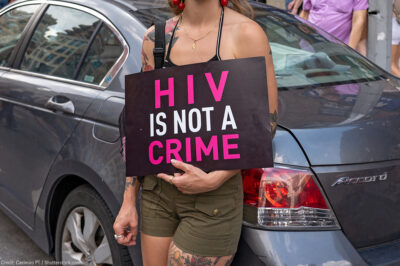ACLU Applauds Supreme Court Decision Upholding the Rights of People with HIV
FOR IMMEDIATE RELEASE
Wednesday, June 24, 1998
WASHINGTON — In a sweeping victory for people with disabilities, the United States Supreme Court today ruled that a woman who has HIV but does not have symptoms is protected from discrimination under the Americans With Disabilities Act (ADA).
“This is a great day for people with HIV, and a great day for all disabled Americans,” said Matt Coles, Director of the American Civil Liberties Unions AIDS Project. “It’s a great day for people with HIV because the Court held that a woman with HIV who was refused treatment by a dentist was protected, and the Court’s opinion suggests in the strongest terms that everyone with HIV will be protected by the ADA.”
“Today, the Court rejected the cramped, narrow approach lower federal courts have been using in applying the ADA,” Coles added. “Instead, the Court has said that the ADA must be interpreted and applied in light of its fundamental purpose — eliminating disability discrimination.”
In a 5-4 ruling, the justices agreed with the lower court that Sidney Abbott, who is infected with HIV, met the criteria for disability under the ADA, because HIV infection “substantially limits” the “major life activity” of reproduction. The Court also gave every indication that anyone infected with HIV is protected against discrimination.
In its friend-of-the-court brief, the ACLU asserted that certain impairments –including HIV infection– always should be considered disabilities, because they inherently substantially limit major life activities. Living with the “ticking time bomb” of HIV, the ACLU said, limits the major life activities of sexual intimacy, caring for oneself, interaction with others, and, indeed, life itself.
The Court also held that doctors and dentists may not rely on their medical judgment alone if they believe that treating a person with HIV presents a risk to their safety.
“This means that employers, businesses, and health care providers have to rely on objective, scientific facts about risk — not on their own individual judgment — before turning away someone with HIV,” said Jennifer Middleton of the ACLU’s AIDS/HIV Project. “This decision reaffirms the basics: discrimination is illegal unless reliable public health studies prove a significant risk of transmission.”
The case began in 1994 when Sidney Abbott, who was HIV positive but had no visible symptoms, arrived for a dental appointment at Dr. Randon Bragdon’s office in Bangor, Maine. Although Bragdon routinely fills cavities in his office, he was unwilling to do so for Abbott because of her HIV status. Rather, Bragdon insisted she be treated at a distant hospital where he did not have hospital privileges, and pay the increased costs.
The case is Bragdon v. Abbot, No. 97-156. The ACLU filed its brief in the case along with approximately 60 civil rights, religious and disabilities groups.
Stay Informed
Every month, you'll receive regular roundups of the most important civil rights and civil liberties developments. Remember: a well-informed citizenry is the best defense against tyranny.






